- Home
- E. M. Forster
Maurice Page 2
Maurice Read online
Page 2
As he opened his eyes to look whether the blots had grown smaller, he remembered George. Something stirred in the unfathomable depths of his heart. He whispered, "George,
George." Who was George? Nobody—just a common servant. Mother and Ada and Kitty were far more important. But he was too little to argue this. He did not even know that when he yielded to this sorrow he overcame the spectral and fell asleep.
3 Sunnington was the next stage in Maurice's career.
He traversed it without attracting attention. He was not good at work, though better than he pretended, nor colos-sally good at games. If people noticed him they liked him, for he had a bright friendly face and responded to attention; but there were so many boys of his type—they formed the backbone of the school and we cannot notice each vertebra. He did the usual things—was kept in, once caned, rose from form to form on the classical side till he clung precariously to the sixth, and he became a house prefect, and later a school prefect and member of the first fifteen. Though clumsy, he had strength and physical pluck: at cricket he did not do so well. Having been bullied as a new boy, he bullied others when they seemed unhappy or weak, not because he was cruel but because it was the proper thing to do. In a word, he was a mediocre member of a mediocre school, and left a faint and favourable impression behind. "Hall? Wait a minute, which was Hall? Oh yes, I remember; clean run enough."
Beneath it all, he was bewildered. He had lost the precocious clearness of the child which transfigures and explains the universe, offering answers of miraculous insight and beauty. "Out of the mouths of babes and sucklings . . ." But not out of the mouth of the boy of sixteen. Maurice forgot he had ever been sexless, and only realized in maturity how just and clear the
sensations of his earliest days must have been. He sank far below them now, for he was descending the Valley of the Shadow of Life. It lies between the lesser mountains and the greater, and without breathing its fogs no one can come through. He groped about in it longer than most boys.
Where all is obscure and unrealized the best similitude is a dream. Maurice had two dreams at school; they will interpret him.
In the first dream he felt very cross. He was playing football against a nondescript whose existence he resented. He made an effort and the nondescript turned into George, that garden boy. But he had to be careful or it would reappear. George headed down the field towards him, naked and jumping over the wood-stacks. "I shall go mad if he turns wrong now," said Maurice, and just as they collared this happened, and a brutal disappointment woke him up. He did not connect it with Mr Ducie's homily, still less with his second dream, but he thought he was going to be ill, and afterwards that it was somehow a punishment for something.
The second dream is more difficult to convey. Nothing happened. He scarcely saw a face, scarcely heard a voice say, "That is your friend," and then it was over, having filled him with beauty and taught him tenderness. He could die for such a friend, he would allow such a friend to die for him; they would make any sacrifice for each other, and count the world nothing, neither death nor distance nor crossness could part them, because "this is my friend." Soon afterwards he was confirmed and tried to persuade himself that the friend must be Christ. But Christ has a mangy beard. Was he a Greek god, such as illustrates the classical dictionary? More probable, but most probably he was just a man. Maurice forbore to define his dream further. He had dragged it as far into life as it would come. He
would never meet that man nor hear that voice again, yet they became more real than anything he knew, and would actually—
"Hall! Dreaming again! A hundred lines!"
"Sir—oh! Dative absolute."
"Dreaming again. Too late." —would actually pull him back to them in broad daylight and drop a curtain. Then he would reimbibe the face and the four words, and would emerge yearning with tenderness and longing to be kind to everyone, because his friend wished it, and to be good that his friend might become more fond of him. Misery was somehow mixed up with all this happiness. It seemed as certain that he hadn't a friend as that he had one, and he would find a lonely place for tears, attributing them to the hundred lines.
Maurice's secret life can be understood now; it was part brutal, part ideal, like his dreams.
As soon as his body developed he became obscene. He supposed some special curse had descended on him, but he could not help it, for even when receiving the Holy Communion filthy thoughts would arise in his mind. The tone of the school was pure—that is to say, just before his arrival there had been a terrific scandal. The black sheep had been expelled, the remainder were drilled hard all day and policed at night, so it was his fortune or misfortune to have little opportunity of exchanging experiences with his school-fellows. He longed for smut, but heard little and contributed less, and his chief indecencies were solitary. Books: the school library was immaculate, but while at his grandfather's he came across an unexpurgated Martial, and stumbled about in it with burning ears. Thoughts: he had a dirty little collection. Acts: he desisted from these after the novelty was over, finding that they brought him more fatigue than pleasure.
All which, if it can be understood, took place in a trance. Maurice had fallen asleep in the Valley of the Shadow, far beneath the peaks of either range, and knew neither this nor that his school-fellows were sleeping likewise.
The other half of his life seemed infinitely remote from obscenity. As he rose in the school he began to make a religion of some other boy. When this boy, whether older or younger than himself, was present, he would laugh loudly, talk absurdly, and be unable to work. He dared not be kind—it was not the thing —still less to express his admiration in words. And the adored one would shake him off before long, and reduce him to sulks. However, he had his revenges. Other boys sometimes worshipped him, and when he realized this he would shake off them. The adoration was mutual on one occasion, both yearning for they knew not what, but the result was the same. They quarrelled in a few days. All that came out of the chaos were the two feelings of beauty and tenderness that he had first felt in a dream. They grew yearly, flourishing like plants that are all leaves and show no sign of flower. Towards the close of his education at Sunnington the growth stopped. A check, a silence, fell upon the complex processes, and very timidly the youth began to look around him.
4 He was nearly nineteen.
He stood on the platform on Prize Day, reciting a Greek Oration of his own composition. The hall was full of schoolboys and their parents, but Maurice affected to be addressing the Hague Conference, and to be pointing out to it the folly of its ways. "What stupidity is this, O andres Europenaici, to talk of abolishing war? What? Is not Ares the son of Zeus himself? Moreover, war renders you robust by exercising your limbs, not forsooth like those of my opponent." The Greek was vile: Maurice had got the prize on account of the Thought, and barely thus. The examining master had stretched a point in his favour since he was leaving and a respectable chap, and moreover leaving for Cambridge, where prize books on his shelves would help to advertise the school. So he received Grote's History of Greece amid tremendous applause. As he returned to his seat, which was next to his mother, he realized that he had again become popular, and wondered how. The clapping continued —it grew to an ovation; Ada and Kitty were pounding away with scarlet faces on the further side. Some of his friends, also leaving, cried "speech". This was irregular and quelled by the authorities, but the Headmaster himself rose and said a few words. Hall was one of them, and they would never cease to feel him so. The words were just. The school clapped not because Maurice was eminent but because he was average. It could cele-
brate itself in his image. People ran up to him afterwards saying "jolly good, old man", quite sentimentally, and even "it will be bilge in this hole without you." His relations shared in the triumph. On previous visits he had been hateful to them. "Sorry, mater, but you and the kids will have to walk alone" had been his remark after a football match when they had trie
d to join on to him in his mud and glory: Ada had cried. Now Ada was chatting quite ably to the Captain of the School, and Kitty was being handed cakes, and his mother was listening to his housemaster's wife, on the disappointments of installing hot air. Everyone and everything had suddenly harmonized. Was this the world?
A few yards off he saw Dr Barry, their neighbour from home, who caught his eye and called out in his alarming way, "Congratulations, Maurice, on your triumph. Overwhelming! I drink to it in this cup"—he drained it—"of extremely nasty tea."
Maurice laughed and went up to him, rather guiltily; for his conscience was bad. Dr Barry had asked him to befriend a little nephew, who had entered the school that term, but he had done nothing—it was not the thing. He wished that he had had more courage now that it was too late and he felt a man.
"And what's the next stage in your triumphal career? Cambridge?"
"So they say."
"So they say, do they? And what do you say?"
"I don't know," said the hero good-temperedly.
"And after Cambridge, what? Stock Exchange?"
"I suppose so—my father's old partner talks of letting me in if all goes well."
"And after you're let in by your father's old partner, what? A pretty wife?"
Maurice laughed again.
"Who will present the expectant world with a Maurice the third? After which old age, grandchildren, and finally the daisies. So that's your notion of a career. Well, it isn't mine."
"What's your notion, Doctor?" called Kitty.
"To help the weak and right the wrong, my dear," he replied, looking across at her.
"I'm sure it is all our notions," said the housemaster's wife, and Mrs Hall agreed.
"Oh no, it's not. It isn't consistently mine, or I should be looking after my Dickie instead of lingering on this scene of splendour."
"Do bring dear Dickie to say how d'ye do to me," asked Mrs Hall. "Is his father down here too?"
"Mother!" Kitty whispered.
"Yes. My brother died last year," said Dr Barry. "The incident slipped your memory. War did not render him robust by exercising his limbs, as Maurice supposes. He got a shell in the stomach."
He left them.
"I think Dr Barry gets cynical," remarked Ada. "I think he's jealous." She was right: Dr Barry, who had been a lady killer in his time, did resent the continuance of young men. Poor Maurice encountered him again. He had been saying goodbye to his housemaster's wife, who was a handsome woman, very civil to the older boys. They shook hands warmly. On turning away he heard Dr Barry's "Well, Maurice; a youth irresistible in love as in war," and caught his cynical glance.
"I don't know what you mean, Dr Barry."
"Oh, you young fellows! Butter wouldn't melt in your mouth these days. Don't know what I mean! Prudish of a petticoat! Be frank, man, be frank. You don't take anyone in. The frank mind's the pure mind. I'm a medical man and an old man and I tell you
that. Man that is bom of woman must go with woman if the human race is to continue."
Maurice stared after the housemaster's wife, underwent a violent repulsion from her, and blushed crimson: he had remembered Mr Ducie's diagrams. A trouble—nothing as beautiful as a sorrow—rose to the surface of his mind, displayed its ungainliness, and sank. Its precise nature he did not ask himself, for his hour was not yet, but the hint was appalling, and, hero though he was, he longed to be a little boy again, and to stroll half awake for ever by the colourless sea. Dr Barry went on lecturing him, and under the cover of a friendly manner said much that gave pain.
5 He chose a college patronized by his chief school friend Chapman and by other old Sunningtonians, and during his first year managed to experience little in University life that was unfamiliar. He belonged to an Old Boys' Club, and they played games together, tea'd and lunched together, kept up their provincialisms and slang, sat elbow to elbow in hall, and walked arm in arm about the streets. Now and then they got drunk and boasted mysteriously about women, but their outlook remained that of the upper fifth, and some of them kept it through life. There was no feud between them and the other undergraduates, but they were too compact to be popular, too mediocre to lead, and they did not care to risk knowing men who had come from other public schools. All this suited Maurice. He was constitutionally lazy. Though none of his difficulties had been solved, none were added, which is something. The hush continued. He was less troubled by carnal thoughts. He stood still in the darkness instead of groping about in it, as if this was the end for which body and soul had been so painfully prepared.
During his second year he underwent a change. He had moved into college and it began to digest him. His days he might spend as before, but when the gates closed on him at night a new process began. Even as a freshman he made the important discovery that grown-up men behave politely to one another unless there is a reason for the contrary. Some third-year people had called on him in his digs. He had expected
them to break his plates and insult the photograph of his mother, and when they did not he ceased planning how some day he should break theirs, thus saving time. And the manners of the dons were even more remarkable. Maurice was only waiting for such an atmosphere himself to soften. He did not enjoy being cruel and rude. It was against his nature. But it was necessary at school, or he might have gone under, and he had supposed it would have been even more necessary on the larger battlefield of the University.
Once inside college, his discoveries multiplied. People turned out to be alive. Hitherto he had supposed that they were what he pretended to be—flat pieces of cardboard stamped with a conventional design—but as he strolled about the courts at night and saw through the windows some men singing and others arguing and others at their books, there came by no process of reason a conviction that they were human beings with feelings akin to his own. He had never lived frankly since Mr Abra-hams's school, and despite Dr Barry did not mean to begin; but he saw that while deceiving others he had been deceived, and mistaken them for the empty creatures he wanted them to think he was. No, they too had insides. "But, O Lord, not such an inside as mine." As soon as he thought about other people as real, Maurice became modest and conscious of sin: in all creation there could be no one as vile as himself: no wonder he pretended to be a piece of cardboard; if known as he was, he would be hounded out of the world. God, being altogether too large an order, did not worry him: he could not conceive of any censure being more terrific than, say, Joey Fetherstonhaugh's, who kept in the rooms below, or of any Hell as bitter as Coventry.
Shortly after this discovery he went to lunch with Mr Corn-wallis, the Dean.
There were two other guests, Chapman and a B.A. from Trinity, a relative of the Dean's, by name Risley. Risley was dark,
tall and affected. He made an exaggerated gesture when introduced, and when he spoke, which was continually, he used strong yet unmanly superlatives. Chapman caught Maurice's eye and distended his nostrils, inviting him to side against die newcomer. Maurice thought he would wait a bit first. His disinclination to give pain was increasing, and besides he was not sure that he loathed Risley, though no doubt he ought to, and in a minute should. So Chapman ventured alone. Finding Risley adored music, he began to run it down, saying, "I don't go in for being superior," and so on.
"I do!"
"Oh, do you! In that case I beg your pardon."
"Come along, Chapman, you are in need of food," called Mr Cornwallis, and promised himself some amusement at lunch.
" 'Spect Mr Risley isn't. I've put him off with my low talk."
They sat down, and Risley turned with a titter to Maurice and said, "I simply cant think of any reply to that"; in each of his sentences he accented one word violently. "It is so humiliating. 'No' won't do. 'Yes' won't do. What is to be done?"
"What about saving nothing?" said the Dean.
"To say nothing? Horrible. You must be mad."
"Are you always talking, may one ask?" inquired Ch
apman.
Risley said he was.
"Never get tired of it?"
"Never."
"Ever tire other people?"
"Never."
"Odd that."
"Do not suggest I've tired you. Untrue, untrue, you're beam-ing."
"It's not at you if I am," said Chapman, who was hot-tempered.
Maurice and the Dean laughed.
"I come to a standstill again. How amazing are the difficulties of conversation."
"You seem to carry on better than most of us can," remarked Maurice. He had not spoken before, and his voice, which was low but very gruff, made Risley shiver.
"Naturally. It is my forte. It is the only thing I care about, conversation."
"Is that serious?"
"Everything I say is serious." And somehow Maurice knew this was true. It had struck him at once that Risley was serious. "And are you serious?"
"Don't ^sk me."
"Then talk until you become so."
"Rubbish," growled the Dean.
Chapman laughed tempestuously.
"Rubbish?" He questioned Maurice, who, when he grasped the point, was understood to reply that deeds are more important than words.
"What is the difference? Words are deeds. Do you mean to say that these five minutes in Cornwallis's rooms have done nothing for you? Will you ever forget you have met me, for instance?"
Chapman grunted.
"Rut he will not, nor will you. And then I am told we ought to be doing something."
The Dean came to the rescue of the two Sunningtonians. He said to his young cousin, "You're unsound about memory. You confuse what's important with what's impressive. No doubt Chapman and Hall always will remember they've met you—"
"And forget this is a cutlet. Quite so."
"Rut the cutlet does some good to them, and you none."
"Obscurantist!"
"This is just like a book," said Chapman. "Eh, Hall?"
"I mean," said Risley, "oh how clearly I mean that the cutlet influences your subconscious lives, and I your conscious, and so I am not only more impressive than the cutlet but more important. Your Dean here, who dwells in Medieval Darkness and wishes you to do the same, pretends that only the subconscious, only the part of you that can be touched without your knowledge is important, and daily he drops soporific—"

 The Celestial Omnibus and Other Stories
The Celestial Omnibus and Other Stories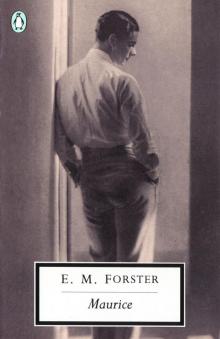 Maurice
Maurice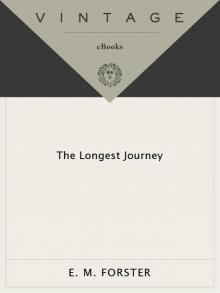 The Longest Journey
The Longest Journey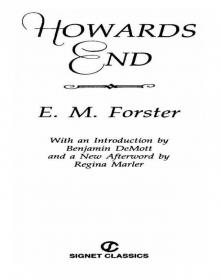 Howards End
Howards End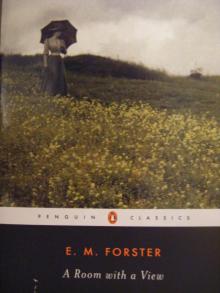 A Room with a View
A Room with a View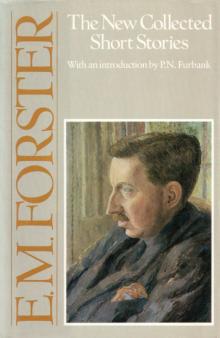 The New Collected Short Stories
The New Collected Short Stories A Passage to India
A Passage to India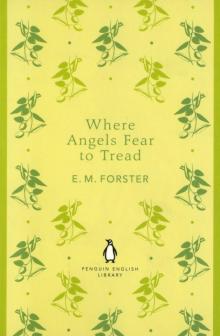 Where Angels Fear to Tread
Where Angels Fear to Tread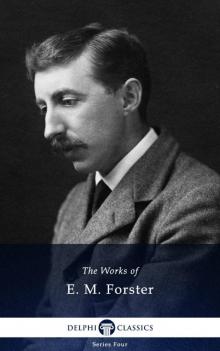 Works of E M Forster
Works of E M Forster Selected Stories
Selected Stories The Machine Stops
The Machine Stops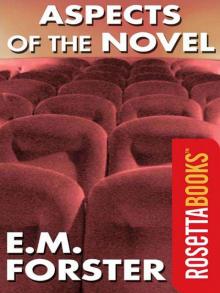 Aspects of the Novel
Aspects of the Novel